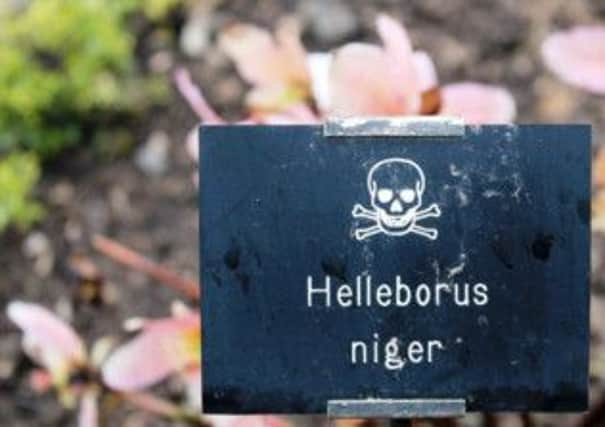Proceed with caution


In fact, just about every plant known to man (and woman) is in some way poisonous. Some may give you a bit of a rash; others will kill you.
Take the lovely Helleborus niger, commonly called Christmas rose or black hellebore. It’s an evergreen perennial flowering plant in the buttercup family, Ranunculaceae, and it’s poisonous.
Advertisement
Hide AdAdvertisement
Hide AdThat doesn’t mean to say we shouldn’t grow it. It just means that we should be a bit more careful with it. Because it would be a crime against plants to avoid those which could, potentially, cause us harm, and the garden would be a barren space.
Helleborus niger brings a wonderful burst of colour – and delicate beauty – to early spring. After weeks or months of cold, grey days, it’s as welcome as the snowdrop or daffodil (whose bulbs, by the way, are poisonous).
So don’t be afraid of it – grow it. It likes a sheltered site and thrives in neutral-to-alkaline soils that are moist, fertile and humus-rich. Mulch annually in autumn and it will be as happy as Larry.
Just don’t eat it, although it was once used in herbal medicine to treat depression...
Advertisement
Hide AdAdvertisement
Hide AdPlants don’t usually have signs warning people to avoid them. There are no common characteristics of form, colour, odour or taste, which distinguish a poisonous or harmful plant from a non-poisonous plant.
But as a general rule of thumb, plants with a bitter taste, funny smell, milky sap or red seeds or berries may be poisonous, so cultivate them with care and always wear gloves if you have to handle them.
Atropa (Deadly Nightshade) tells you via its name that it’s not to be messed with it’s poisonous and a skin irritant, but how many people know that.
Most people know that the seeds of laburnum are poisonous, but what about Prunus laurocerasus (Cherry laurel) or the lovely Daphne mezereum? Yes, they’re both potentially harmful.
Advertisement
Hide AdAdvertisement
Hide AdAs are yew, euphorbia, Spanish broom and even rhubarb, the leaves off which are potentially deadly. And there are thousands more ‘common or garden’ plants with the potential to cause harm.
But don’t let it get you down. Just exercise a bit more care. Oh, and tell the children to keep their hands off.